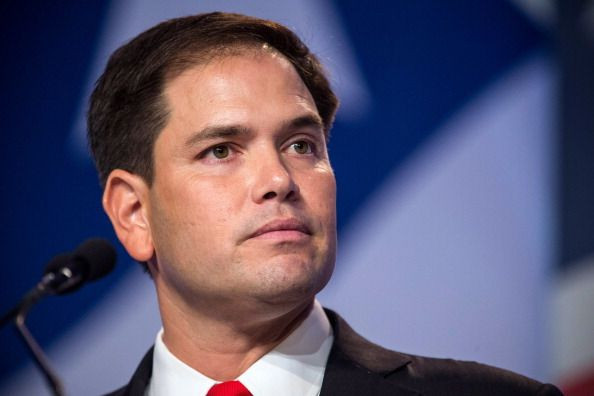Marco Rubio’s Money: Wall Street, The Auto Industry Are Funding Senate Campaign Of Failed Presidential Candidate
U.S. Sen. Marco Rubio of Florida announced Wednesday that he's changed his mind. The once-rising Republican star, now a failed presidential candidate, reversed months of denial and said he would, after all, run for re-election to the Senate. He's a late entry into what could be a competitive race, but as he scrambles to make up ground, he has one advantage left from his presidential run: He happens to know a lot of rich folks who don’t mind making donations to politicians.
"Little Marco," as he was branded by the man who beat him for the Republican nomination, has big money.
Rubio was one of the highest-profile candidates in the Republican primary field this year — that is, he was talked about a lot even though he failed to win over many actual voters — and built a big network of supporters and major donors.

“The importance of a connection from a donor to a candidate can rise from ideological to access to influence,” said Josh Stewart, deputy communications director for the Sunlight Foundation. “Some people just want their phone calls returned; other people have a policy agenda that they want to have input on with a member of Congress or a candidate."
Rubio needs those donors at least as much as they need him: His campaign committee recently disclosed that it was nearly $1.9 million in debt.
Rubio still has a titan of an ally in the Conservative Solutions PAC. That committee, created to support the senator even though it cannot directly coordinate with his campaign, boasted $1.7 million cash on hand in its most recent disclosure filing.
There were 15 individual donors who have chipped in at least one or more donations totaling $1 million to Conservative Solutions this year, according to a donor list compiled by the Center for Responsive Politics and analyzed by International Business Times.
That list includes five who gave $5 million or more. Longtime Rubio supporter and billionaire Norman Braman, a Florida auto dealer and former owner of the Philadelphia Eagles, dropped $7 million into the super PAC. Hedge fund manager Paul Singer — whose fund, Elliott Management, made a fortune buying Argentina's debt at bargain prices and then demanding full price as repayment — gave $5 million. Ken Griffin, the CEO of the hedge fund Citadel, gave $5 million. Larry Ellison, a co-founder of Oracle Corp., gave $5 million. Finally, Ron Cameron, who has donated millions to conservative super PACs, threw in $5 million as well.
That Singer and Griffin made that list should come as no surprise. Wall Street was, by far, Rubio’s biggest benefactor in his presidential run, according to CRP data. The financial sector donated $18.5 billion to all of his campaigns combined during that time. His next most generous supporter is the automotive industry (see: Braman) with $7.4 million. Insurance and electronics manufacturing follow with $5.5 and $5.4 million, respectively.
In addition to publicly disclosed donors, Rubio also relied on so-called dark money groups. A political nonprofit with a name similar to Rubio’s supporting super PAC, Conservative Solutions Project, raised $13.8 million within weeks of his joining the presidential race — $13.5 million of which came from a single donor — and supported the candidate through opposition research and polling, according to a CRP investigation. It’s difficult to know exactly who donated, how much was spent and on what.
“Marco Rubio’s allies have shown they’re willing to use those groups,” Stewart said. “I would look closely at whether they use those again.”
© Copyright IBTimes 2024. All rights reserved.






















